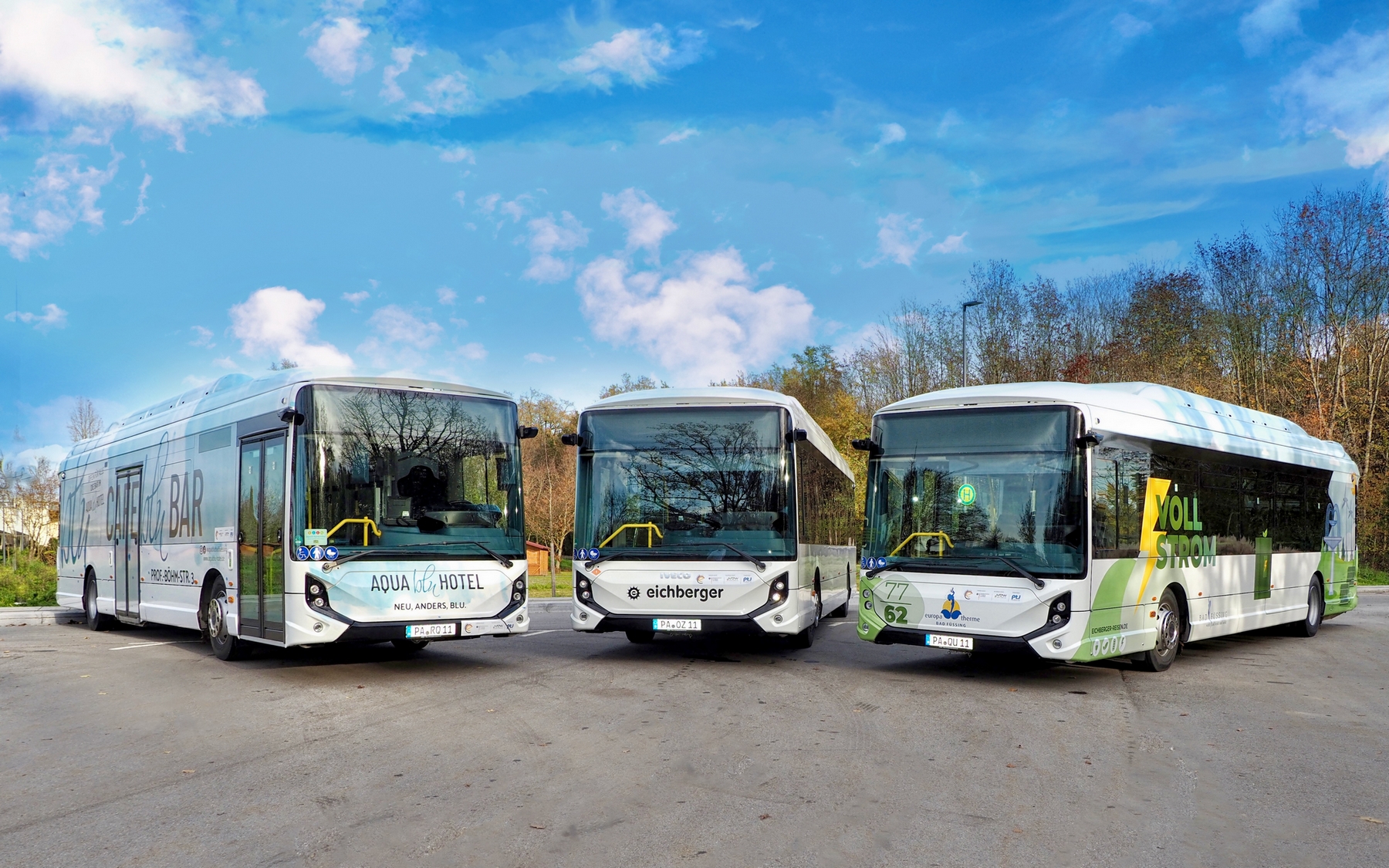 Bad Füssings neue E-Bus-Flotte: Moderne Niederflurbusse von Iveco. Foto: Kur&Gästeservice Bad Füssing
Bad Füssings neue E-Bus-Flotte: Moderne Niederflurbusse von Iveco. Foto: Kur&Gästeservice Bad Füssing
Bad Füssing in Lower Bavaria was the first spa resort in Germany to completely convert its public transport to electric mobility. Since the end of 2022, five new electric buses have been running on all local and spa transport routes. They will cover around 350,000 kilometers a year. “Bad Füssing is once again setting standards,” says Bad Füssing Mayor Tobias Kurz. According to him, the project is another central building block on Bad Füssing’s path to an environmentally conscious and resource-saving future as a tourist community – an issue that is important to more and more German citizens.
According to surveys, more than half of German citizens now pay attention to ecological aspects when on vacation, as a recent survey conducted in November 2022 by the online travel portal “Urlaubspiraten” found out. “This trend opens up great opportunities and potential for the tourism of tomorrow and is increasingly changing the market and competition,” says Bad Füssing’s spa & tourism manager Daniela Leipelt. “It is important to more and more people to take a vacation with a ‘good conscience’,” Leipelt says.
This groundbreaking project was made possible in close cooperation between the municipality and Bad Füssing’s mastermind Manfred Eichberger and his bus company Eichberger Reisen. The five modern low-floor buses from the Italian manufacturer Iveco that are used in Bad Füssing have a range of over 400 kilometers and also take guests to their destination in particular comfort thanks to air conditioning and screens on board.
The special feature: The new vehicles can be lowered – and are therefore barrier-free, so that people with limited mobility can also use them with a rollator or wheelchair. In recent years, the municipality of Bad Füssing has already made several bus stops barrier-free.
Investments in the millions
The company invested around 3.6 million euros in the new buses and the necessary charging infrastructure. This was made possible by extensive subsidies from the federal government and the Free State of Bavaria. “With the municipality of Bad Füssing and the district of Passau, we had convinced partners on our side right from the start,” says Manfred Eichberger, who is involved in many industry committees throughout Germany for sustainable and environmentally friendly travel. Above all, the new buses are also a benefit for the environment and the health resort as a whole. The new e-buses are significantly quieter than their diesel-powered predecessors and run virtually pollution-free. “The trend toward electric mobility in local public transport is unmistakable, and many towns and districts are working to make the switch as quickly as possible,” he knows. Bad Füssing, however, is the first spa town in Germany to have succeeded in doing so, he says. “The municipality has a time lead of at least five years also because of the very complex charging infrastructure,” he knows.
New e-charging columns, LED street lighting, regenerative heating and an energy master plan.
These initiatives for the mobility of tomorrow are part of a comprehensive package of measures with which the municipality of Bad Füssing intends to continue setting standards in terms of sustainability in the coming years: for example, six new e-charging stations with a total of twelve charging points will be built in the town in the coming months. This year, around 1,600 conventional street lights in the town will also be replaced with environmentally friendly LED spotlights – a project in which the municipality is investing more than one million euros. According to Mayor Tobias Kurz, this will reduce annual electricity consumption for street lighting by 86 percent, from around 250,000 today to just 35,000 kilowatt hours per year.
When renovating and constructing new buildings, the municipality also pays attention to the latest energy-saving standards and environmentally friendly, regenerative heating systems, as was recently the case with the completely renovated spa gymnasium, which will be handed over in the fall of 2022. The municipal council has also already decided to draw up an energy master plan, which is intended to point out new paths toward the energy solutions of the future.
Many hosts are also focusing on sustainability
Many of the more than 300 hosts in Bad Füssing are also on the path to greater sustainability, with more and more of them focusing on local food and regional value chains. Examples of this are the organic thermal hotel Falkenhof or also the camping facility Holmernhof, which have already received numerous awards for their environmental initiatives. “Through these numerous initiatives, we succeed in making this lived sustainability more and more visible to our guests,” says spa & tourism manager Daniela Leipelt. www.badfuessing.com
You can read this and other articles on the topic of Mobility 4.0 electric-networked-autonomous in the current eMove360° magazine, free Download-PDF or order Printversion at sabine.metzger@emove360.com